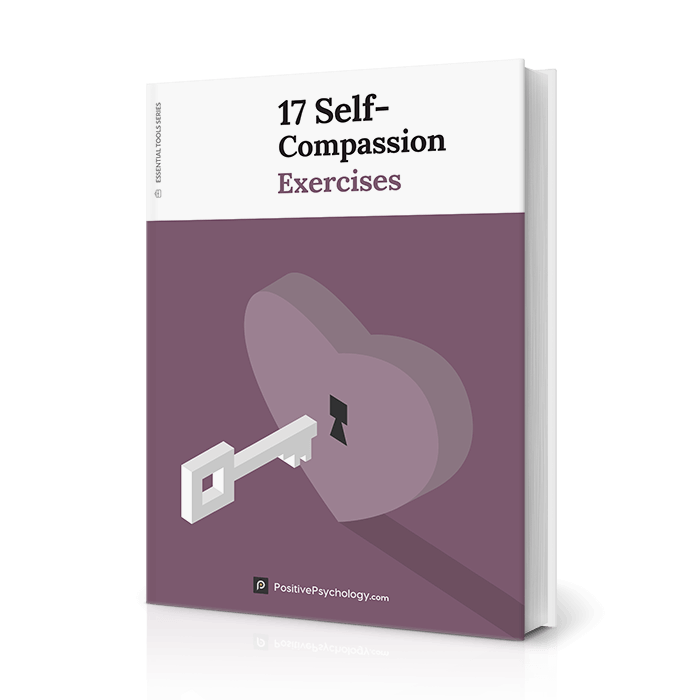16 Self-Concept Questionnaires, Activities and Tests (+PDF)
 Take a moment and ask yourself: Who am I?
Take a moment and ask yourself: Who am I?
How do you answer such a complex question? It’s tough and one that psychologists have consistently sought to help us with.
‘Self-concept’ might not be a term you’re generally familiar with, but it’s one that’s well worth knowing about. It essentially refers to the way we think about ourselves, evaluate our appearance, thoughts, and behaviors, and perceive ourselves both as individuals and in comparison to others. It’s also linked to concepts of self-awareness, self-esteem, and self-image.
The term self-concept has grown in popularity owing to the way it encompasses a more robust idea of self, rather than individual terms.
Before you read on, we thought you might like to download our three Self-Compassion Exercises for free. These detailed, science-based exercises will not only help you increase the compassion and kindness you show yourself but will also give you the tools to help your clients, students or employees show more compassion to themselves.
This Article Contains:
- Popular Psychology Definitions of Self-Concept
- The Personal Self-Concept Questionnaire (PSQ)
- The Self-Concept Questionnaire (SCQ)
- 3 More Ways to Map Beliefs About the Self
- 3 Self-Concept Activities & Exercises
- Best Online Self-Concept Test
- 3 More Tests and Assessments
- Handy PDF Worksheets
- A Take-Home Message
- References
Popular Psychology Definitions of Self-Concept
A popular definition is provided by Baumeister (1999):
The individual’s belief about himself or herself, including the person’s attributes and who and what the self is.
Rogers (1959) suggested that self-concept has three core aspects:
- Self-Image – The view you have of yourself
- Self-Worth – How much value you have in yourself
- Ideal-Self – Who you really wish you were
Lewis (1990) also theorized that the development of individual self-concept has two key components:
- The Existential Self – The realization that you exist as separate to others.
- The Categorical Self – The realization that you exist as an individual object in the world, with distinct properties, such as your age, hair color, and gender. As we grow older, this component also begins to include psychological traits.
The Personal Self-Concept Questionnaire (PSQ)
The Personal Self-Concept Questionnaire (PSQ) was developed by Goñi, Madariaga, Axpe & Goñi (2011) in response to the plethora of self-concept tools available. The researchers wanted to create a shorter measurement that provided an accurate representation of self-concept overall.
The questionnaire is made up of 22 statements, divided into four subcategories:
- Self-fulfillment
- Autonomy
- Honesty
- Emotional self-concept
Example statements from the questionnaire include:
- To do anything, I first need other people’s approval. (Autonomy)
- I consider myself to be a very uptight and highly strung person. (Emotional Self-Concept)
- I have yet to achieve anything I consider to be important in my life. (Self-Fulfilment)
- I am a man/woman of my word. (Honesty)
Participants use a scale of one to five to respond to the statements, with one being ‘Totally Disagree’ and five being ‘Totally Agree.’
The Self-Concept Questionnaire (SCQ)
Initially developed by Saraswat (1984), the Self Concept Questionnaire is one of the more popular questionnaires when it comes to measuring self-concept.
The questionnaire itself contains 48 statements that aim to measure self-concept across six different aspects:
- Physical
- Social
- Temperamental
- Educational
- Moral
- Intellectual
Example statements include:
- I feel different from most people and wish I was more like them. (Social)
- I only partially believe in myself. (Temperamental)
- I feel I am a person of worth. (Moral)
- I have trouble taking criticism from other people. (Temperamental)
Participants rate their answers to the statements on a scale from 1 to 5, with one being ‘very unlike me’ and five being ‘very true of me.’ A higher score indicates a high sense of self-concept, with a lower score indicating a lower sense of self-concept.
3 More Ways to Map Beliefs About the Self
Although the PSQ and SCQ are the two most commonly used questionnaires to measure and map self-concept, there are several other questionnaires and tools that aim to explore self-belief too.
Below are three I’ve come across in my research that might be of interest to you:
1. Academic Self-Concept Scale for Adolescents (ASCS)
The Academic Self-Concept Scale for Adolescents (Minchekar, 2019) was developed in response to the idea that many self-concept questionnaires and measures are quite broad. The researchers wanted to narrow this down and focused only on measuring self-concept concerning academic skills and performance.
The scale is broken down into eight distinct sub-categories that it measures:
- Self-Concept of Academic Ability
- Self-Concept of Academic Interests
- Self-Concept of Study
- Self-Concept of Examination
- Self-Concept of Academic Interactions
- Self-Concept of Academic Efforts
- Self-Concept of Curriculum
- Self-Concept of Academic Future
The scale contains 57 statements that ask participants to rate themselves from one to five, with one being ‘Never’ and five being ‘Always.’ Higher scores indicate a higher level of Academic Self-Concept, and participants with a higher score were found to be more confident in their academic capabilities.
The ASCS is still a relatively new tool, and you can read more about its development.
2. Harrill Self-Esteem Inventory
The Harrill Self-Esteem Inventory was developed by Counselor, Susan Harrill, as a measurement for self-esteem within self-concept. It is made up of 25 statements that participants are required to respond to.
Example statements from the inventory include:
- I feel of equal value to other people, regardless of my performance, looks, IQ, achievements, or possessions (or lack of them).
- I take responsibility for my feelings, emotions, thoughts, and actions. I do not give others credit or blame for how I feel, think, or what I do.
- I learn and grow from my mistakes rather than deny them or use them to confirm my unworthiness.
- I nurture myself with kind, supportive self-talk.
Participants respond with a score between zero and four as follows:
0 = I never think, feel, or behave this way.
1 = I do less than half the time.
2 = I do 50% of the time.
3 = I do more than half the time.
4 = I always think, feel, or behave this way.
After responding to all statements, participants tally their total score, with a higher score indicating a higher level of self-esteem.
3. The Twenty Statements Test
The Twenty Statements Test (Kuhn & McPartland, 1954) was developed to specifically measure self-image as a part of self-concept, although it covers other areas of self-concept too.
The twenty questions probe participants to respond to the question ‘Who am I’ with ‘I am …’ answers. The questions are broken down into five subcategories:
- Social groups and classifications
- Ideological beliefs
- Interests
- Ambitions
- Self-evaluations
Kuhn (1960) states that the majority of responses to the questions could be divided into three groups:
- Social Roles – Responses related to external aspects of the self, for example, ‘I am a mother/daughter/teacher/doctor.’
- Personality Traits – Responses related to internal aspects of the self, for example, ‘I am funny/patient/short-tempered/kind.’
- Physical Descriptions – Responses related to image aspects of the self, for example, ‘I am tall/short/fat/thin.’
Related: 21 Self-Image Examples and Activities to Use the Theory Today
3 Self-Concept Activities & Exercises
Exploring self-concept can be a great learning and growth experience for individuals of all ages. Below are three easy to do activities for individuals or groups of any age to help learn more about self-concept.
1. ‘Who Am I?’ Exercise
This is a wonderful introductory exercise that can be used with individuals or groups. The premise is straightforward to replicate, and participants can take as long as they need to complete the initial statements, with plenty of encouragement for discussion.
You will need:
- Pens
- Paper
Purpose:
To encourage participants to think more deeply about the ideas and labels they have about themselves.
Method:
Provide each participant with a list of statements – suggested amount 15-20 – that ask them to think about who they are. Some example statements include:
- My favorite food is …
- My favorite music is …
- An important person in my life is …
- Something I dislike …
- An idea for my future I have is …
Encourage participants to answer all statements. Ask them to reflect on the answers they choose and why these are important to them. Remind them there are no wrong or right answers, just the opportunity to engage with their sense of self-concept.
2. ‘My Strengths’ Exercise
This exercise is great to encourage participants to start thinking about their self-concept of their strengths in critical areas of life. Again, it is very easy to set up and will enable some great conversations with individuals or groups.
You will need:
- Pens
- Paper
Purpose:
To encourage participants to reflect on their strengths in different key areas.
Method:
Provide participants with pen and paper and ask them to divide their paper into four sections with the following headings:
- Social
- Interests/Sports
- Family
- School/Work
Next, read out some statements that could relate to each of the sections and ask participants to write down the ones they feel most relate to them. Aim for 5-6 statements for each of the four categories. Example statements include:
- I always try my best at school/work.
- I am a caring friend.
- I help out around the house.
- I like to be creative.
- I enjoy team sports.
Once participants get the idea, encourage them to reflect further on the four areas, and write down some of their unique strengths.
3. ‘Three Compliments Journal’ Exercise
This exercise is great for any individual who struggles with self-concept, and who has low self-esteem or low self-image in particular. Similar to many journal exercises; it is easy to implement and consistency is key to its success.
You will need:
- Journal/notebook
- Pen
Purpose:
To increase ideas of self-concept – in particular, self-esteem and self-image.
Method:
Participants are required to spend 5-10 minutes a day reflecting on three compliments they would give themselves about how they behaved, interacted, engaged, or looked during the day. The compliments can focus on anything they like. The idea is to reflect on the positives about themselves they might otherwise dismiss.
Example compliments could include things like:
- I liked my outfit today, and the compliments I received because of it.
- Today I was kind to the lady in the store and offered to help her with her bags.
- I’m proud of my school/work presentation. My teacher/boss said I did a great job.
Ask participants to repeat this exercise daily, for as long as they need to. Remind them it’s okay if they forget some days and it might be challenging to think of three things at first, but it will get easier over time.
How to build your self image – Proctor Gallagher Institute
Best Online Self-Concept Test
There are many online self-concept tests you can take – some are paid, and some are free – and it’s important to know that these tests are only snapshots. Sampling a few different tests will give you a more robust sense of your self-concept.
One of the most popular online tests is the Self-Esteem Test from Psychology Today. This test contains a variety of statements that you will need to respond to. It should take no more than 15 mins to complete.
It is free to take, and you’ll receive a ‘snapshot’ of your results at the end. You can invest in a more in-depth result by paying a small fee.
3 More Tests and Assessments
Besides the previously mentioned assessments, we share three more tests below.
1. Robson Self-Concept Questionnaire
The Robson Self-Concept Questionnaire follows a similar pattern to the previous questionnaires explored in this article. It consists of 30 statements relating to different areas of self-concept. Example statements include:
- I’m glad I am who I am.
- I am reliable.
- It would be boring if I talked about myself.
- I have a pleasant personality.
Participants rate their responses to the statements on a scale of zero to seven with zero being ‘Completely Disagree,’ and seven being ‘Completely Agree.’ A higher score means a higher sense of self-concept.
2. Self Description Questionnaire (SDQ)
The Self-Description Questionnaire was developed by Marsh (1990), and has two formats:
- The SDQI, designed for use with primary school students.
- The SDQII, designed for use with secondary school students.
The SDQ contains 43 statements that participants are required to respond to on a scale of one to five, with one being ‘False’ and five being ‘True.’
Example statements from the questionnaire include:
- I worry about a lot of things.
- Overall I am a failure.
- I am honest.
- I get along well with my parents.
3. Social Style Questionnaire
This questionnaire follow a slightly different format in how to assess self-concept. Instead of singular statements that ask participants to rate their response, these questionnaire provide two statements and asks participants to select the one they feel is most like them.
The Social Style Questionnaire aims to measure how participants feel they interact with others daily.
Examples of a pair of statements from this questionnaire include:
A. I tend to tell people what is on my mind.
B. I tend to keep things to myself.
A. I see myself as playful and fun-loving.
B. I see myself as serious and thoughtful.
Handy PDF Worksheets
In researching this article, I came across a wealth of PDF worksheets and exercises to help you on your way to further exploring self-concept.
Below I’ve shared some of my favorite ones:
1. Therapist Aid – About Me Sentence Completion Worksheet
This is a great introductory worksheet to encourage initial thinking around self-concept. The Sentence Completion Worksheet contains a set of statements that asks participants to reflect and explore different scenarios that made them feel a certain way.
2. Therapist Aid – Strength Exploration Worksheet
This Strength Exploration Worksheet is slightly similar to the ‘My Strengths’ exercise so that it could be used as a great accompaniment. It asks participants to reflect on their strengths in three key areas of life: relationships, profession, and personal fulfillment. Additionally, it includes a more in-depth exploration of strengths under each of the specific headings.
3. Thought Diary for Negative Self-Evaluations Worksheet
The Thought Diary Worksheet can be used as a journal/diary insert and asks participants to reflect on negative self-evaluations they may have about themselves. The worksheet is comprehensive and laid out well to encourage a step by step process through evaluating the idea of self-concept being explored.
Additional reading material includes a selection of 27 books on self-esteem.
A Take-Home Message
Self-concept is such a broad area of psychology, and yet it’s a fascinating one. It really hones in one of the deeper parts of answering that question ‘Who am I?’.
Some of the questionnaires and exercises we’ve visited in this article are more general, so I hope you’ll see these as a great starting point for further exploration and personal growth around your ideas of self-concept.
Have you tried any of these exercises, or know of others that you’ve found particularly beneficial? I’d love to hear about them! Please leave a comment below.
We hope you enjoyed reading this article. Don’t forget to download our three Self Compassion Exercises for free.
- Baumeister, R. F. (1990). The nature and structure of the self: An overview. In R. Baumeister (Ed.), The self in social psychology (pp. 1-20). Philadelphia, PA, US: Psychology Press (Taylor & Francis).
- Goñi, E., Madariaga, J. M., Axpe, I., & Goñi, A. (2011). Structure of the Personal Self-Concept (PSC) Questionnaire. Retrieved from: http://www.redalyc.org/pdf/337/33719289006.pdf
- Kuhn, M. H. & McPartland, T. S. (1954). An Empirical Investigation of Self-Attitudes.
- Kuhn, M. H. (1960). Self-attitudes by age, sex and professional training. Sociological Quarterly, 1, 39-56.
- Lewis, M. (1990). Self-knowledge and social development in early life. In L. A. Pervin (Ed.), Handbook of personality (pp. 277-300). New York: Guilford.
- Marsh, H. W. (1990). Causal ordering of academic self-concept and academic achievement: A multi-wave, longitudinal panel analysis. Journal of Educational Psychology, 82, 646-656.
- Minchekar, V. S. (2019). Academic Self Concept Scale for Adolescents: Development, Reliability, and Validity of ASCS. Retrieved from: https://www.researchgate.net/publication/331873419_Academic_Self_Concept_Scale_for_Adolescents_Development_Reliability_and_Validity_of_ASCS
- Rogers, C. (1959). A theory of therapy, personality, and interpersonal relationships as developed in the client-centered framework. In (ed.) S. Koch, Psychology: A study of science. Vol. 3: Formulations of the person and the social context. New York: McGraw Hill.
- Saraswat, R. K. (1984). Manual for Self-Concept Questionnaire. Agra, India: National Psychological Corporation.
Let us know your thoughts
Read other articles by their category
- Body & Brain (49)
- Coaching & Application (57)
- Compassion (26)
- Counseling (51)
- Emotional Intelligence (24)
- Gratitude (18)
- Grief & Bereavement (21)
- Happiness & SWB (40)
- Meaning & Values (26)
- Meditation (20)
- Mindfulness (45)
- Motivation & Goals (45)
- Optimism & Mindset (34)
- Positive CBT (28)
- Positive Communication (20)
- Positive Education (47)
- Positive Emotions (32)
- Positive Leadership (18)
- Positive Parenting (4)
- Positive Psychology (33)
- Positive Workplace (37)
- Productivity (16)
- Relationships (46)
- Resilience & Coping (36)
- Self Awareness (21)
- Self Esteem (38)
- Strengths & Virtues (31)
- Stress & Burnout Prevention (34)
- Theory & Books (46)
- Therapy Exercises (37)
- Types of Therapy (64)






What our readers think
Hi!
May I know what database is used for the automatic scoring system of Robson’s Self-concept Questionnaire? I was having a hard time understanding the manual one.
Thank you!
Hi Rinrin,
you can use this automatic scoring system.
I hope it helps 🙂
Warm regards,
Julia | Community Manager
Thank you so much for your response!
This is me again.
May I know what specifc scores the respondents should have in order to know that they have low or high self-concept?
Hi Rinrin,
Norms from different studies are provided for comparison. For example, a control group from Robson (1989) had a mean total score of 137.0 (SD = 20.2), while a group of patients with DSM-III Generalized Anxiety Disorder (GAD) had a mean score of 108.0 (SD = 24.8). This information can be used to interpret individual scores in relation to these norms.
I hope this helps 🙂
Warm regards,
Julia | Community Manager
Hai,
how are you? I would like to have some suggestions on the questions which may help my leaners to realize their characters, their weaknesses and help them to formulate their studies. can i put those questins in MS forms in which the students will be answering themself find their Strengths and Weaknesses?
Hi Shain!
I recommend the VIA Survey of Character Strengths to assess strengths and weaknesses. It is available for free on the VIA Institute on Character website.
Hope this helps!
Kind regards,
Julia | Community Manager
Hi Nicole. Im Aishah.. Could u plz to advise me Self Concept Questionnaire focus on Activity Physical and Nutrition for Adolescent Student? And which website that I can get for more info?
TQ so much
Hi Aishah,
Thanks for your question. Unfortunately I was not able to find a Self-concept questionnaire which includes all the constructs you are looking for. However, this article dives into some of the most relevant self-concept and self-esteem questionnaires.
Additionally, this article explores some of the constructs you mentioned and their relations (self-concept, dietary patterns, and nutrition in adolescents).
I hope this helps!
Kind regards,
-Caroline | Community Manager
Hi Nicole, the scales on broad positive psychology themes are very impressive. I would be happy if you could specify or share with me any self-concept scale specifically for teachers. This scale will help me to adapt or to bring out a similar scale on this topic.
Hi Baldwin,
Glad this was helpful for you! Definitely take a look at the Teacher Self-Concept Evaluation Scale by Villa and Calvete (2001):
https://doi.org/10.1016/S0191-491X(01)00028-1
You can download the paper with the items for free here: https://www.academia.edu/659520/Development_of_the_Teacher_Self_Concept_Evaluation_Scale_and_Its_Relation_to_Burnout
Hope this helps!
– Nicole | Community Manager
Hi Nicole
Can you help me how to get permission for Robson self concept questionnaire. I am using this questionnaire for my research. I need permission. Kindly guide me
Hi Iqra,
Thanks for your question. You can find the Robson Self-Concept Questionnaire here. As long as you properly reference the scale, you can use it for your research.
I hope this helps.
– Caroline | Community Manager
Do you have any on line courses which would help in building my self?
Hi Rajiv,
We offer a complete Masterclass series that covers themes like self-acceptance and strength development which may be of interest to you. These courses include a workbook, hours of video, and everything else you need to better understand yourself and also teach the material to others. You can find more information about these courses on our store page:
https://pro.positivepsychology.com/product/the-science-of-self-acceptance/
https://pro.positivepsychology.com/product/maximizing-strengths-masterclass/
Let me know if I can answer any questions.
– Nicole | Community Manager
Hello! Would you know if I could be given permission to use Academic Self-Concept Scale for Adolescents (ASCS)? Is there a scale intended for younger population? Can you please help me get in touch with the person/people concerned?
Hi Hazel,
The ASCS can be used freely without permission from the author for research purposes.
If you’re looking for an alternative you can use with a younger crowd, Reynold’s (1988) scale has been used with youth 10 years and older: https://youthrex.com/wp-content/uploads/2019/10/Academic-Self-concept-Scale-1.pdf
Hope this helps!
– Nicole | Community Manager
Where can I get the range for Robson Self concept questionnaire? to know if one falls in high or low self concept? thank you
Hi Cristine,
You’ll find some population norms for the scale here: https://scales.arabpsychology.com/s/robson-self-concept-questionnaire/
I’m not aware of any published information stating cut-offs for high and low levels on this measure, but this website indicates that an average score on this measure (within a non-clinical population) is 140. Hopefully that helps a little.
– Nicole | Community Manager
Thank you so much for your reply! Do you know a way where I can contact Robson or people who arebaccountable for the scale?
Hi Cristine,
You’ll find Robson’s contact here: https://www.psych.ox.ac.uk/team/phil-robson 🙂
– Nicole | Community Manager
Hii,
Can I get the professional self concept scale? will be helpful..
Hi Christina,
Professional self-concept scales tend to be specific to the role type (e.g., nurse, teacher). So can you please let me know the sort of sample you will be administering it to? Then I’ll be happy to advise 🙂
– Nicole | Community Manager
Hii
I am looking for theAcademic Self-Concept Scale for Adolescents (ASCS). May you help to needful?
Hi Moni,
I cannot seem to find this scale online, but you can contact the author of this scale (Vikas Minchekar) via ResearchGate to get a copy of the questionnaire items.
I hope this helps a little!
– Nicole | Community Manager